Our health team are a fundamental part of the work we do at Centrepoint. So much has changed for them – and the young people they support – since the pandemic hit, and they have been working hard to provide a virtual substitute for their usual face-to-face sessions, including contact over WhatsApp, Skype and phone calls. But adapting is not always straightforward: the days can be long, and young people can easily become overwhelmed with the situation.
Here, Centrepoint therapist Monica walks us through what a day looks like for her in the midst of the pandemic.
Morning
Today is Monday – most people dread it, but for me it’s the day I most look forward to. With lockdown measures in place, it’s been over a month since I’ve been able to have face-to-face therapy sessions with any young people. I’ve been providing telephone therapy sessions, which the majority of the people I support have been on board with. This is why Mondays are my new favourite day: it’s my busiest and provides me with the most structure. Structure is super important right now, not only for my own wellbeing but also for my young people. Their lives tend to be quite inconsistent already, so the last thing I want to do is add to that.
My morning begins with checking notes for the young people I’m going to speak to today and catching up on emails. Once 10:30 hits, it’s time to call my first young person. No answer. I start a text message that says I’ll ring them every few minutes until 10:45, but they send me one first apologising – they’ll be ready in a couple of minutes.
Eventually our session begins. This young person has been finding lockdown difficult. Their coping strategies, like many, are intrinsically linked with social interaction and without that, their thoughts start spiralling. They feel trapped, focused on a past they can no longer influence and a future they’re afraid of because they don’t know what it holds. We end the session by booking our next appointment, and I remind them to get in touch with my colleague who supports them with maintaining healthy relationships.
Lunch
No rest for the wicked! I step outside for five minutes, taking in the sunshine with a mug of green tea. Then I move straight onto a call with one of the mental health advisors; I’ve picked up line management duties for this colleague, so we talk through some of their more complex cases. One of their children periodically interrupts to ask for a brownie, or if they can go on another hike like last weekend. Building a play set in the garden has been a lifesaver for my colleague, as they can keep an eye on the children while checking in with their young people via phone.
It’s about 12:15, so I warm up some pizza I made last night (from scratch!) and get ready for my next session at 13:00. Cooking is one of my coping strategies – plus, I’m all about eating something delicious…
As the clock strikes on the hour, I call my next young person who answers straight away. Living on their own and separated from their children is really taking its toll. This young person just wants to hug, kiss and play with their children again. Around 8.2 million people in the UK live alone, which can have a significant impact on our wellbeing, leaving us feeling sad and disconnected. Consensual human touch releases chemicals in our brain that reduce stress and increase our feelings of being bonded to others – it’s why new parents have skin-to-skin contact with newborns.
Our session ends in tears, but this was positive – it gave this young person the release they had been looking for. It’s 14:03 and I need to ring a mental health practitioner with statutory health services to find out more about the work they’re undertaking with one of my young people. It’s a helpful call and seems like the work we’re both doing with this person will complement each other well.
Afternoon
My call finishes just shy of 14:30, but I need a couple minutes to breathe and refocus. I text my young person to say I’ll be a few minutes late for our call, which they are fine with. When I make contact 10 minutes later they answer, but are silent on the other end. It takes a few minutes to ease into a conversation, which is normal. They’re starting to let down some of the blocks they have, connecting more to their feelings. This is a hard process; they’ve been through a lot and those barriers have been in place to protect them. The loneliness of lockdown isn’t helping matters either – it seems to be exacerbating the negative feelings they’ve been trying to lock away. This session overruns, but sometimes that has to happen, especially when I need to ensure they’re in a decent place when I leave the call. It didn’t help that our call got cut off at one point – a disadvantage with remote sessions.
The day’s gone quick; it’s 15:49 already. I finally have a little of bit of time to check in with my colleague, the healthy relationships advisor. We discuss our days and pretend we’re in our office having a normal workday conversation, which is nice.
I make myself another green tea and ring my last young person at 16:00. Social isolation is really affecting them, increasing their stress levels and their feelings of loneliness, and negatively influencing their self-esteem. This has been recurring since the start of lockdown and something we’ve been steadily working on. I spend a bit of time answering some questions they have, meaning our session ran over. I spend the next 15 minutes answering some emails I hadn’t gotten around to replying to during the day. At 17:30, I ring my healthy relationships colleague again to review their cases from the last week. We resolve to speak tomorrow, as they need to make dinner for their family. With a final email sent off at 18.00 to my boss, I decide to call it a day, and go for a much needed walk while it’s still light out.
This isn’t my ideal way of working, but as long as I’m still able to provide therapy to my young people, I will make it through – we all will.




